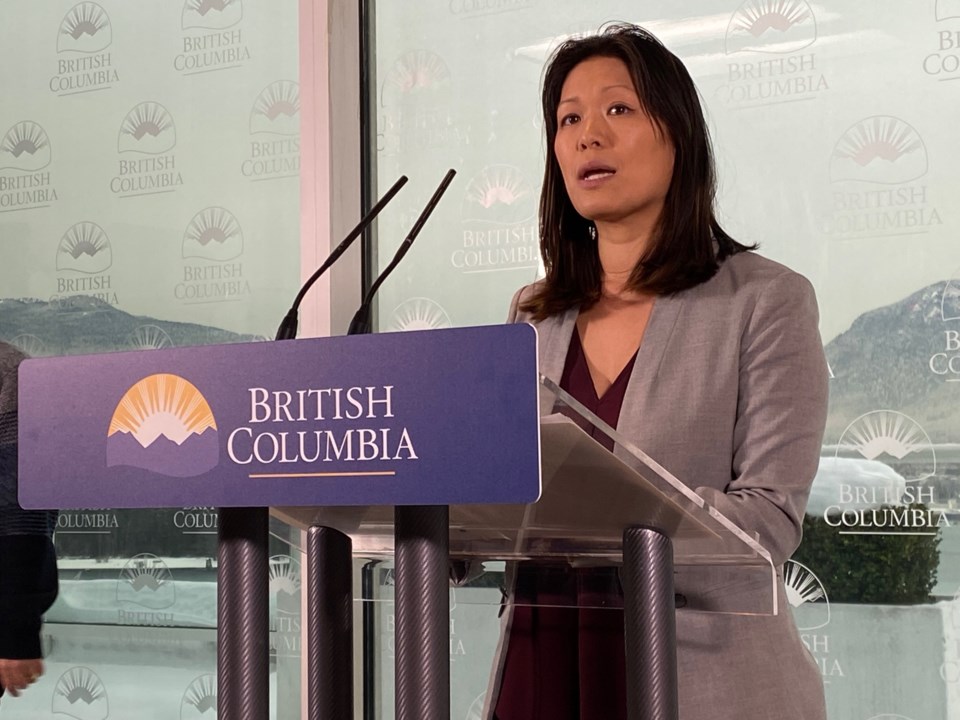As roaring wildfires crested the hills above Kelowna on Friday afternoon, B.C.’s Emergency Minister was asked whether the province would declare a state of emergency.
The answer? No.
“So far, we have the tools that we need,” said Bowinn Ma, during a 1 p.m. media briefing at the Vancouver cabinet offices.
It was a surprising answer, given wildfire officials had just finished outlining a dire situation, urging potentially thousands of people to pack their bags in preparation of evacuation.
A CBC reporter pushed Ma. “When does it get bad enough?” she asked.
An entirely reasonable question, given officials had just warned the worst wildfire season in the province’s history was forecast to hit its worst moment over the next 24 to 48 hours. If that doesn’t justify a state of emergency, what does?
“The declaration of a state of provincial emergency itself, though, it is largely an administrative step,” explained Ma.
“But the tools that we need right now are available to us through the Wildfire Act, and the Wildfire Act allows us to spend whatever it takes, to acquire resources, to deploy resources in order to fight wildfires.”
Ma did leave the door open a crack to the idea — the province was gearing up “if required,” she said — and it’s a good thing she did, because fewer than five hours later the minister found herself standing beside the premier executing a reversal of her position.
“As a result of this rapid deterioration we are declaring a state of emergency to ensure we have rapid access to any tools we may need to respond to this situation,” said Premier David Eby.
“These tools are necessary to support comms, to support families, and support those brave frontline workers battling the fires in our forests and communities.”
By Saturday, Ma’s view of the merit of a state of emergency had evolved again.
“This declaration gives the province extraordinary powers to keep people, communities and first responders safe,” she said.
From “administrative step” to “necessary” to “extraordinary powers” all in the span of 24 hours. If your head is spinning, you aren’t alone.
This isn’t necessarily to pick on Ma, who is one of the more capable ministers in Eby’s cabinet and who has done good work briefing the public so far on drought and wildfire risk. She says she’s following the advice of experts inside her ministry.
If that’s true, the advice of her experts doesn’t seem to make a lot of sense. It has left the public, justifiably, confused over what has become an annual exercise in hair-splitting over declaring states of emergencies when it is clear to an entire province that an emergency is already underway.
The New Democrat government has struggled with this issue since taking power in 2017. It was slow to call the state of emergency for wildfires that year as well. Since then, it has had to do so three more times, including in 2018, 2021 and this year. Each time, it has to justify why it hasn’t done so earlier.
In 2021, the situation got so bad that mayors and regional governments went public with their frustration over the lack of a declaration. The government appeared reluctant to move, in part because it had just exited a previous 16-month state of emergency for the COVID-19 pandemic and wanted to project a return to normalcy for the public.
A state of emergency does not offer any more immediate front-line firefighting services, on that Ma is correct. Nor does it authorize the province to spend any more money on firefighting.
But it does unlock expanded federal aid, legal powers for provincial officials to enter private property to fight fires, the ability for government to seize necessary supplies and heavy equipment as firefighting requires, the power to ban travel to regions, the power to fix prices of items to prevent price-gouging, and more.
It also sends a signal to the public that the provincial government is doing everything possible to help.
Eby seemed to have pick up on all of that, in his comments changing Ma’s position Friday evening.
“From a high level the state of emergency declaration does a couple of things - first of all it communicates to people across the province the seriousness of the deteriorating situation that we’re facing,” he said.
If the foot-dragging and hesitancy on states of emergency does indeed come from the officials within Emergency Management BC and the BC Wildfire Service, then it’s up to the politicians overseeing those areas to set clear guidelines on how they can do better.
Because nobody is well-served with the status quo of annual bickerings. It turns critical situations into political fights. It sows confusion in the minds of the public. It undermines confidence in the work being done by emergency officials to keep everyone safe.
We can, and should, do better before next year’s wildfire season forces us to relive this confusion all over again.
Rob Shaw has spent more than 15 years covering B.C. politics, now reporting for CHEK News and writing for Glacier Media. He is the co-author of the national bestselling book A Matter of Confidence, host of the weekly podcast Political Capital, and a regular guest on CBC Radio. [email protected]




